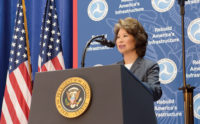No New DOT Expansion Projects Expected In Missouri

Many engineers, consultants and contractors will have to seek work in places other than Missouri through the rest of the decade. Early this month, the Missouri Dept. of Transportation announced it will not embark on any new expansion projects in its five-year FY2016-20 transportation plan, due to lack of funding.
In May, ENR’s “Low & Slow Across America’s Infrastructure” tour made stops along Interstate 70 in St. Louis and in Kansas City, where MoDOT Chairman Stephen Miller spoke of the then-impending plan to focus on maintaining 8,000 miles out of 34,000 total miles of state-owned highways and roads. “For the other 26,000 miles, we are unable to make a commitment,” he said.
MoDOT chief engineer Ed Hassinger noted that, just a few years ago, MoDOT’s annual construction budget was about $1.3 billion. “This year, we awarded $600 million in work. Next year, we’ll drop [to] somewhere around $325 million,” he says.
According to the American Road & Transportation Builders Association (ARTBA), nine states last year retracted or delayed projects due to federal funding uncertainty; this year, 19 states were delaying or considering delaying projects. That tally did not include Missouri.
The MoDOT announcement comes just ahead of the end of a short-term extension of MAP-21 on Aug. 1. Set to expire last year, it was extended through stopgaps by Congress, which continues to tarry on passing a long-term reauthorization. Voters in 2014 defeated a state ballot initiative for a 0.75¢ sales-tax increase that would have raised some $5 billion for transportation projects.
Successful state and local transportation ballot initiatives have helped to keep construction programs afloat, such as in Clark County, Nev. There, a 2014 pilot program to index the state fuel tax through 2016—raising it about 3¢ a year—is expected to generate $700 million for projects in southern Nevada, says NDOT spokesman Tony Illia.
Although such initiatives help, “it still hasn’t changed that fundamental relationship of the federal aid program to capital spending,” says ARTBA chief economist Allison Premo Black. “On average, it contributes about 52% of DOT capital outlay spending. The lack of will to get things done in Congress has a ripple effect through every state program.”
With no financial capital left, MoDOT will delve into human capital, says Miller. It is soliciting and researching private-sector ideas in an initiative called “Road to Tomorrow,” offering the stretch of I-70 between St. Louis and Kansas City as a test bed for transportation tech. “What do we have to lose?” Miller says.




